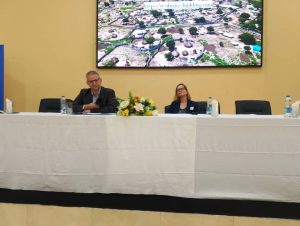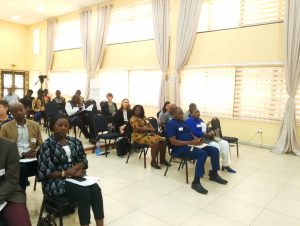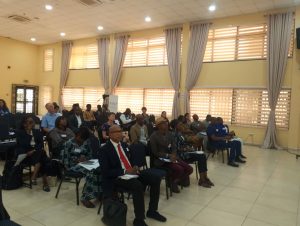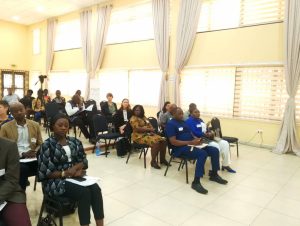The Merian Institute for Advanced Studies in Africa (MIASA) at the University of Ghana has held a 2 day Policy Conference on Security and Peace Building in Africa to gather stakeholders and policymakers across the continent to consolidate gains made in protecting democracy across board.
The well attended Conference which took place at the Institute for Statistical , Social and Economic Research (ISSER) on the campus of the University of Ghana from December 10- 11 ,2024 brought together policymakers, academics , security experts and other stakeholders.
This MIASA conference is jointly organised by the German Institute for Global and Area Studies (GIGA), the Kofi Annan International Peacekeeping Training Centre (KAIPTC) and the Legon Centre for International Affairs and Diplomacy (LECIAD) at the University of Ghana.
The theme of the Conference was ; “Dealing with conflict, preparing for sustainable peace; Current research and its policy implications”.
Speaking at the event , the Keynote Speaker, Dr Aderemi Ajibewa intimated that most of the violence and security threats particularly focused on terrorism in the West African and Sahelian territories have been perpetuated due to a lack of consistent efforts from Sub Regional leaders to share critical information and allocate enough resources to security chiefs to deal ruthlessly with private armed gangs or rebels that take advantage of the absence of state actors.
He added that the recent coups in Mali , Burkina Faso and Guinea have dire implications for regional stability since the incentives for insurgents to move in and cause chaos in those nations which has negative effects on citizens of such countries.
” The issues of security in the WestAfrican Sub region have been of grave concern to political authorities particularly ,ECOWAS, as most of the policies and measures seem to be chasing after the inactions and actions of the terrorists in some of the countries battling the insurgencies , the lack of a synergy and lack of effective collaboration between leaders in the sub region ahead of time leaves room for the success of some attacks by rogue elements which is a worry to centralized power in these countries.
We need the main stakeholders and policymakers to get back to the strategy board and use data driven and innovative ways of securing the peace and tranquility that developing democracies need to prevail , more resources and political will must be channeled into building robust security architecture across board whilst also working in unison to defeat the common enemy if we want to stop the spread of insurgencies in the remaining states in the ECOWAS sub region.
The withdrawal of the three nations which have experienced military takeovers (Mali, Guinea and Burkina Faso ) from the sub regional body further undermines collective security and provides leeway for these rogue elements to benefit from the chaos of an already fragile location wise and this spells doom for sustainable peace and security”.
Also, Dr Aderemi further revealed that the ECOWAS Monitoring Group (ECOMOG) which has a Conflict Monitoring Mechanism which came into effect in 2008 in Ouagadougou has been very effective among member countries to strengthen democratic accountability and peacebuilding measures and to reduce grievances among member states from descending into war situations.
He implored that member states need to invest more resources into the mechanism in order for regional governments to implement policies and frameworks that create better living conditions for citizens not to fall victim for use by a few disgruntled extremist elements.
” It is not all doom and gloom though , because for the furtherance of good governance in the sub region too, ECOWAS has through its ECOMOG(ECOWAS Monitoring Group) process have put in place some 15 key initiatives that need to be followed by all member states which are signatories to that strategic document which was done in 2008 in Ouagadougou to reduce inequalities amongst citizens and empower local economies.
The process has been strong enough in promoting good governance , equitable allocation of resources for development ,respect for the rule of law which has largely kept governments in check and reducing the incentives for civilians to pick up arms to fight for the dividends of democracy.
Inspite of the modest gains, there is the need for more resources to fuelled into the monitoring and evaluation of such policies that will empower the sub regional body to peer review individual states to meet the aspirations of the document as a way of reduce instability and disillusionment across some of the member states that might be lagging behind”.
Furthermore , the second Keynote Speaker for the Conference , Dr Jana Krause delved deeper into the intricacies of what causes both internal and external conflicts in Africa and how policy measures can be developed by African governments to reduce such tensions among conflicting parties .
She was of the view that peace building on the continent was very sensitive and required targeted interventions by governments in building up strong institutions that protect vulnerable groups in society as well as creating policies , and programmes that empower the youth economically so as not to be used as conflict merchants for both localized and externalized violence which stagnates sustainable development.
” Research overtime done by both academics and global partners on the security situation in Africa shows that there are differing dynamics which underpin existing violence and conflicts , using the communal clashes in Kenya in 2007 and that of what happened in Jos in Nigeria , very little is mutually exclusive in those situations in terms of lives being lost and properties which are damaged and its resultant effect on the lives of citizens.
It is now incumbent on African governments to be more interested in bridging the widening gap between the elite and the common class ,so as to reduce social tensions which might be the trigger for , persons to want to use violence as a means of getting the fruits of development which must benefit all classes in society.
Recent economic data shows that with education and technological advancements rapidly catching up with the youthful people who are the majority in most African nations, the allure of extremist elements or conflicts is less appealing to that demographic set and as such , democracy must be used in a responsible manner to meet the aspirations of the vibrant youth in this ultra competitive world”.
Goals:
The MIASA Conference “Dealing with conflict, preparing for sustainable peace: Current research and its policy implications” will provide space for exchange between researchers, policymakers and other key stakeholders in sustainable peace-making to present and discuss state-of-the-art research and its policy implications. Emphasis will be given to African perspectives on intervention practices and peacebuilding efforts on the continent, drawing on insights from both research and practice.
Theme:
Despite considerable efforts to foster peace, multiple interlinked security challenges persist in Africa. The number of battle-related casualties has been on the rise – both globally and on the African continent. While decentralised forms of violence such as Jihadism, urban riots and smaller insurgencies are a key concern, conflicts with strong regional and international involvement have also increased significantly. African governments, regional organisations, Western actors and the international community have all sought to foster peace and security on the continent through instruments such as diplomatic initiatives, mediation, sanctions and peacebuilding initiatives. Intensifying religious violence and climate change are both pressing challenges to peace that carry an important gendered dimension. How religious divides or extreme weather are linked to conflict must hence be re-examined if strategies helping restore peace in vulnerable societies are to be developed. The conference seeks to address sources of and solutions to conflict in pursuit of sustainable peace in Africa by bringing into dialogue research on key challenges, actors and instruments. It invites proposals addressing but not limited to the following topics:
– Fostering peace in a changing climate: Climate change is altering the global security landscape. Central Africa, East Africa, West Africa and the Sahel all find themselves severely affected by climate change. Yet despite experiencing similarly adverse conditions, including droughts or heavy rainfall, the levels of violence affecting their respective communities differ significantly. Climate change’s impacts are also compounded by political tensions, violent conflicts and complex humanitarian emergencies. Moreover, the gendered repercussions of climate change for peace and security are currently poorly understood. What is the relationship between climate change, extreme weather, its impact on (women’s) livelihoods and conflict? And how must governance policies and peacebuilding initiatives be revised to increase the resilience of conflict-prone communities and to create gender-responsive adaptation and mitigation measures?
– Addressing violent extremism and bridging religious divides: One of the greatest current security threats – especially in the Lake Chad Basin, the Horn of Africa and the Sahel – stems from Salafi-Jihadist insurgencies. This proliferation of violent extremism and terrorism has undermined peaceful interreligious co-existence in many societies and added to pre-existing political, economic as well as social difficulties. At the same time, coup leaders from Burkina Faso, Guinea, Mali and Niger have all cited a lack of progress on counterterrorism efforts – while regional as well as international responses to these extremist groups have faced significant challenges. What promising policies can help address the complex nature of Salafi-Jihadist violence? Which actors are the most viable promoters of peace? And how can religious communities, leaders and ideas contribute to conflict resolution and peaceful interreligious co-existence?
– International responses to armed conflict: The number of conflicts in which both Western and non-Western actors are involved is on the rise. Often, different countries as well as regional and international organisations deploy a variety of means to address armed conflict in parallel, despite these measures not necessarily reinforcing each other. Furthermore, citizens’ and policymakers’ perceptions on the legitimacy and effectiveness of these international actors vary considerably. What do the public and political elites in respective African countries think about these diverse external attempts to address violent conflict on the continent? What are rationales for international actors initiating as well as eventually ending peacemaking and peacebuilding efforts? How do these diverse conflict-management tools complement or contradict each other?
Jana Krause is a Professor in the Department of Political Science at the University of Oslo. Her research focuses on conflict dynamics and civilian agency in communal conflicts and civil wars, peace processes and local peacebuilding, and the gender dimensions of peacebuilding. She has conducted field research on these issues in South Sudan, Nigeria, Kenya, Myanmar, and Indonesia. Krause is author of ‘Resilient Communities: Non-Violence and Civilian Agency in Communal War’ (Cambridge University Press 2018), and co-editor of ‘Civilian Protective Agency in Violent Settings’ (Oxford University Press 2023).
Dr Aderemi Ajibewa is the Director for the National Institute for Policy and Strategic Studies ,Nigeria and an academic with over 2 decades experience in Conflict and Security Issues globally and past Political Affairs at the ECOWAS Commission.





